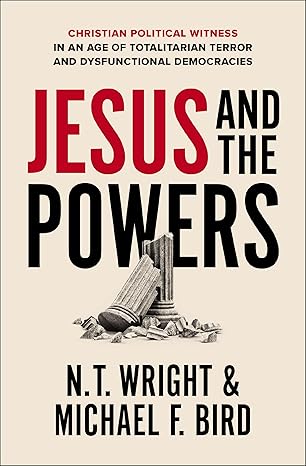
Jesus Himself
‘Jesus Himself’ consists of brief messages preached by South African pastor Andrew Murray (1828-1917), which originally appeared in the South African Pioneer. Though originally written in 1893, this book feels like many of Andrew Murray's other works-as fresh and relevant as if it were written yesterday! This book describes the relationship that all followers of Christ long for- to be guided by Christ's Spirit on His path, hearing His voice and seeing with His light.
It is packed with devotion for Jesus, and describes how to get closer to Jesus. Murray is candid in noting that there is nothing short of Jesus that will satisfy our hearts, and nothing short of complete devotion to Him that will transform our lives into ones that glorify Jesus. “How possible it is to have Jesus Himself with us and never to know it, and how possible to preach of, and to listen to, all the truth about Jesus Himself and yet not to know Him?”
Andrew Murray was concerned about this very real possibility and provided us with the antidote. In this book, Murray reflects on the profound core of the Christian life: exclusive and complete reliance on Jesus himself to bring about everything he has promised for us. It will surely inspire you and draw you closer to Jesus.
BEST DEALS
About the Author
Andrew Murray (1828-1917) was an amazingly prolific Christian writer. He lived and ministered as both a pastor and author in the towns and villages of South Africa. Some of Murray's earliest works were written to provide nurture and guidance to Christians, whether young or old in the faith; they were actually an extension of his pastoral work. Once books such as Abide in Christ, Divine Healing, and With Christ in the School of Prayer were written, Murray became widely known, and new books from his pen were awaited with great eagerness throughout the world. He wrote to give daily practical help to many of the people in his congregation who lived out in the farming communities and could come into town for church services only on rare occasions.
As he wrote these books of instruction, Murray adopted the practice of placing many of his more devotional books into thirty-one separate readings to correspond with the days of the month. At the age of seventy-eight, Murray resigned from the pastorate and devoted most of his time to his manuscripts. He continued to write profusely, moving from one book to the next with an intensity of purpose and a zeal that few men of God have ever equaled. He often said of himself, rather humorously, that he was like a hen about to hatch an egg; he was restless and unhappy until he got the burden of the message off his mind. During these later years, after hearing of pocket-sized paperbacks, Andrew Murray immediately began to write books to be published in that fashion. He thought it was a splendid way to have the teachings of the Christian life at your fingertips, where they could be carried around and read at any time of the day. One source has said of Andrew Murray that his prolific style possesses the strength and eloquence that are born of deep earnestness and a sense of the solemnity of the issues of the Christian life.
Nearly every page reveals an intensity of purpose and appeal that stirs men to the depths of their souls. Murray moves the emotions, searches the conscience, and reveals the sins and shortcomings of many of us with a love and hope born out of an intimate knowledge of the mercy and faithfulness of God. For Andrew Murray, prayer was considered our personal home base from which we live our Christian lives and extend ourselves to others. During his later years, the vital necessity of unceasing prayer in the spiritual life came to the forefront of his teachings. It was then that he revealed the secret treasures of his heart concerning a life of persistent and believing prayer. Countless people the world over have hailed Andrew Murray as their spiritual father and given credit for much of their Christian growth to the influence of his priceless devotional books.
Read Sample
1 : “Their Eyes were Opened, and They Knew Him.”
The words, from which I want to present a simple message, will be found in the Gospel according to St. Luke, the 24th chapter and the 31st verse: “And their eyes were opened, and they knew Him.” Some time since, I preached a sermon with the words “Jesus Himself” as the text; and as I went home I said to those who were walking with me: “How possible it is to have Jesus Himself with us and never to know it, and how possible to preach of, and to listen to, all the truth about Jesus Himself and yet not to know Him.” I cannot say what a deep impression was made upon me as I thought over it.
Now these disciples had spent a most blessed time with Jesus, but if they had gone away before He revealed Himself that evening, they would never have been sure that it was Jesus, for their eyes were holden that they should not know Him. That is, alas, the condition of a great multitude in the Church of Christ. They know that Christ has risen from the dead. They believe, and they very often have blessed experiences that come from the risen Christ. Very often in a time of Convention, or in time of silent Bible reading, or in a time of the visitation of God’s grace, their hearts burn; and yet it can be said of a people whose hearts are burning within them, that they did not know it was Jesus Himself.
And now if you ask me what is to be the great blessing to be sought, my answer is this: Not only should we think about Jesus Himself and speak about Him and believe in Him, but we should come to the point that the disciples in the text arrived at, “and they knew Him.” Everything is to be found in that.
If I read that story of the disciples on the way to Emmaus, I get from it four stages in the Christian life. Just think! How did they begin the morning that day? With
Hearts sad and troubled,
because they thought Jesus was dead. They did not know that He was alive, and that is the state of very many Christians. They look to the Cross, and they struggle to trust Christ, but they have never yet learned the blessedness of believing that there is a living Christ to do everything for them. Oh! that word of the angel to the women! “Why seek ye the living among the dead?” What is the difference between a dead Christ, whom the women went to anoint, and a living Christ? A dead Christ, I must do everything for; a living Christ does everything for me.
The disciples began the morning with a sad heart. I fancy very possibly they spent a sleepless night. Oh! the terrible disappointment! They had hoped that Christ would be the Deliverer of Israel, and they had seen Him die an accursed death. On the morning of that first day of the week, they rose with sad hearts—the bitter sadness cannot be expressed. That is just the life of many Christians. They try to believe in Jesus and to trust Him, and to hope in Him, but there is no joy. Why? Because they do not know that there is a living Christ to reveal Himself.
Then there is the second stage. What is that? The stage of which Christ speaks:
“Slow of heart to believe.”
They had the message from the women. They told the stranger who walked with them: “Certain women have astonished us, telling us they have seen an angel, who says He is alive.” And Christ replied to them: “Oh! fools, and slow of heart to believe.” Yes! there are many Christians to-day who have heard and who know that they must not only believe in a crucified Christ, but in a living Christ, and they try to grasp it and take it in, but it does not bring them a blessing, and why? Because they want to feel it and not to believe it. They want to work for it, and with efforts get hold of it, instead of just quietly sinking down and believing, “Christ, the living Jesus, He will do everything for us.” That is the second stage. The first stage is that of ignorance, the second stage is that of unbelief—the doubting heart that cannot take in the wonderful truth that Jesus lives.
Then comes the third stage—
The burning heart.
Jesus came to the two disciples, and after He had reproved them and said: “Oh! fools, and slow of heart to believe,” He began to open the Scriptures to them, and to tell them of all the wonderful things the prophets had taught. Then their eyes were opened, and they began to understand the Scriptures. They saw that it was true that it was prophesied that Christ must rise. As He talked, there came out from Him—the living risen One—a mighty influence, and it rested upon them, and they began to feel their hearts burn within them with joy and gladness.
You still say perhaps: “That is the stage we want to come to.” No; God forbid you should stop there. You may get in that third stage—the burning heart—and yet something is still wanting—the revelation of Christ. The disciples had had a blessed experience of His divine powers, but He had not revealed Himself, and oh! how often it is that at Conventions and in churches, and in meetings and in blessed fellowship with God’s saints, our hearts burn within us. These are precious experiences of the working of God’s grace and Spirit, and yet there is something wanting. What is that? Jesus Himself has been working upon us, and the power of his risen life has touched us, but we cannot say, “I have met Him. He has made Himself known to me.” Oh, the difference between a burning heart, which becomes cold after a time, which comes by fits and starts, and the blessed revelation of Jesus Himself as my Saviour, taking charge of me and blessing me and keeping me every day! This is the stage of
The satisfied heart.
Oh my brother, my sister! It is what I ask for you, and it is what I am sure you ask for yourself. I ask it for myself. Lord Jesus! may we know Thee in thy divine glory as the risen One, our Jesus, our Beloved and our mighty One. Oh! if there are any sad ones who cannot take this in, and who say, “I have never known the joy of religion yet”—listen, we are going to tell you how you can. All will center round this one thing, that just as a little child lives day by day in the arms of its mother, and grows up year by year under a mother’s eye, it is a possibility that you can live every day and hour of your life in fellowship with the Holy Jesus.
He will do it for you.
Come, and let your sad heart begin to hope. Will He reveal Himself? He did it to the disciples and He will do it to you. Perhaps there are some who have got beyond the sad heart and who yet feel, “I have not got what I want.” If you throw open your heart and give up everything but just believing and allowing Him to do what He wants, it will come. God be praised! it will come.
Jesus will reveal Himself.
Perhaps you have arrived at the stage of the burning heart, and can tell of many blessed experiences, but somehow there is a worm at the root. The experiences do not last, and the heart is so changeable. Oh come, my beloved! Follow Christ. Say, “Jesus, reveal Thyself that we may know Thee Thyself. We ask not only to drink of the living water, we want the fountain. We ask not only to bathe ourselves in the light, we want the Sun of Righteousness within our hearts. We ask not only to know Thee, who hast touched us and warmed our hearts and blessed us, but we want to know that we have the unchangeable Jesus dwelling within our hearts and abiding with us forevermore.”
Now comes the question which I really wanted to put,—What are the conditions under which our blessed Lord reveals Himself? Or, put it this way,—To whom is it that Jesus will reveal Himself? We have only to see how he dealt with these disciples, and we get the answer. What is the answer? First of all I think I find here that Christ revealed Himself to those disciples
Who had given up everything for Him.












